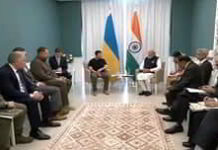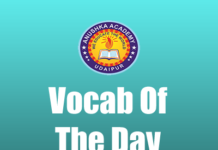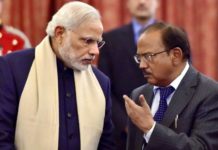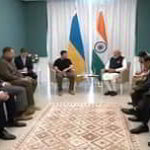Bharat Ratna Award 2024
Every year 3 Bharat Ratna Awards are distributed but for the year 2024, a total of 5 recipients have received the Bharat Ratna Award 2024. Indian Government announced that Karpoori Thakur and Chaudhary Charan Singh have been awarded with Bharat Ratna posthumously. Lal Krishna Advani, Mankombu Sambasivan Swaminathan, and PV Narasimha Rao are also awarded with this prestigious award.
1. Karpoori Thakur (24 January 1924 – 17 February 1988): He was an Indian politician who served two terms as the 11th Chief Minister of Bihar. He was popularly known as Jan Nayak.
2. Chaudhary Charan Singh (23 December 1902 – 29 May 1987): He was an Indian politician and served as the 5th prime minister of India between 28 July 1979 and 14 January 1980.
3. Lal Krishna Advani (born 8 November 1927): He is an Indian politician who served as the 7th Deputy Prime Minister of India from 2002 to 2004. He is one of the co-founders of the Bharatiya Janata Party (BJP) and a member of the Rashtriya Swayamsevak Sangh (RSS), a right-wing Hindu nationalist volunteer organization.
4. MS Swaminathan (born 7 August 1925): Mankombu Sambasivan Swaminathan was an Indian agronomist, agricultural scientist, plant geneticist, administrator, and humanitarian. Swaminathan was a global leader of the green revolution.
5. PV Narasimha Rao (born 28 June 1921): Pamulaparthi Venkata Narasimha Rao, popularly known as P. V. Narasimha Rao, was an Indian lawyer, statesman and politician who served as the 9th prime minister of India from 1991 to 1996. He is known for introducing various liberal reforms to India’s economy
Bharat Ratna Award List
The recommendations for the Bharat Ratna award are given by the Prime Minister of India. It is awarded by the President of India. Till now, 48 eminent persons have been awarded Bharat Ratna Award. It is also presented to people posthumously and as of now, 14 eminent persons have been awarded posthumously. Under Article 18 (1) of the Indian Constitution, no title whether military or academic distinctions shall be conferred by the state, and awards like Bharat Ratna can’t be used as suffixes or prefixes to the name of awardees. There are no monetary grants linked with this award. The awardees receive a Certificate/ Sanad signed by the contemporary president of India and a peepal- leaf shaped medal. On this medallion, the state emblem of India with Satyamev Jayate is inscribed.
Bharat Ratna Award Winners List
There are many stories related to the Bharat Ratna Award nomination such as the Government of India decided to present this award posthumously to Subhash Chandra Bose in 1992 but his family members and supporters did not allow this as they did not believe in his death. Many times in the past, the name of Major Dhyanchand (Magician of Hockey) is raised for presenting him the Bharat Ratna Award but he has not been awarded yet. The complete list of the recipients of the Bharat Ratna Award is given below. Here * indicates the posthumous recipient of the Bharat Ratna Award. No Bharat Ratna awards were given in 2021 and 2022.
| Bharat Ratna Award Winners List | ||
| Recipients (State/UT) | Year | Key Notes |
| C. Rajagopalachari/ Rajaji (Tamil Nadu) |
1954 | C. Rajagopalachari/ Rajaji was the last Governor General of India. He was the founder of the Swatantra Party. He was the conscience keeper of MK Gandhi. |
| Sarvapalli Radhakrishnan (Tamil Nadu) |
1954 | Sarvapalli Radhakrishnan was the first Vice President of India. He became the country’s second President. |
| C. V. Raman (Tamil Nadu) |
1954 | C. V. Raman became the first Asian scientist to receive a Nobel Prize in any branch of science. He is famous for his discoveries in physics like Raman Scattering. |
| Bhagwan Das (Uttar Pradesh) |
1955 | Bhagwan Das was the co-founder of Mahatma Gandhi Kashi Vidyapith. He also contributed to the foundation of Banaras Hindu University. |
| M. Visvesvaraya (Karnataka) |
1955 | M. Visvesvaraya’s birth anniversary on 15th September is celebrated as Engineer’s Day in the country. He was a civil engineer who contributed much to the country’s dam development. |
| Jawaharlal Nehru (Uttar Pradesh) |
1955 | Jawaharlal Nehru became the first and longest tenure Prime Minister (PM) of India. He was PM at the time of receiving this award. |
| Govind Ballabh Pant (Uttarakhand) |
1957 | Govind Ballabh Pant was elected to be the first chief minister of the state of Uttar Pradesh. He was an ardent supporter of making Hindi a national language. |
| Dhondo Keshav Karve (Maharashtra) |
1958 | Dhondo Keshav Karve was a great social reformer and was famous for women’s education, and widow remarriage. He founded the Widow Marriage Association. |
| Bidhan Chandra Roy (West Bengal) |
1961 | Bidhan Chandra Roy is recognized as the Maker of Modern West Bengal. His birth anniversary on 1st July is celebrated as National Doctors’ Day in the country. |
| Purushottam Das Tandon (Uttar Pradesh) |
1961 | Purushottam Das Tandon was titled Rajarshi. He became the speaker in Uttar Pradesh Legislative Assembly. He supported the Hindi language making it the official language. |
| Rajendra Prasad (Bihar) |
1962 | Rajendra Prasad swore as the first President of India. He was actively involved in the non-cooperation movement with Mahatma Gandhi Ji. |
| Zakir Husain (Andhra Pradesh) |
1963 | Zakir Husain was elected to be the second Vice President and third President of India. He became the Vice Chancellor of Aligarh Muslim University. |
| Pandurang Vaman Kane (Maharashtra) |
1963 | Pandurang Vaman Kane was a great Indologist and Sanskrit scholar. He is well known for his works like ‘History of Dharmasastra: Ancient and Medieval Religious and Civil Laws in India’. |
| Lal Bahadur Shastri (Uttar Pradesh) * |
1966 | Lal Bahadur Shastri became the first posthumous recipient of the Bharat Ratna Award. He was elected to be the second PM of India. He is popular in country for his slogan ‘Jai Jawan Jai Kisan’. |
| Indira Gandhi (Uttar Pradesh) |
1971 | Indira Gandhi was the first female recipient of the Bharat Ratna Award. She was PM during the Indo-Pak War of 1971. She was PM of India at the time of receiving this award. |
| V. V. Giri (Odisha) |
1975 | V. V. Giri served as the first acting President of India. He became the 4th President of India. He organized many trade unions for the freedom struggle. |
| K. Kamaraj (Tamil Nadu) * |
1976 | K. Kamaraj was recognized as the King Maker in Indian Political History as he contributed much to making Lal Bahadur Shastri and Indira Gandhi the PM of India. |
| Mother Teresa (West Bengal, born in North Macedonia) |
1980 | Mother Teresa is the first and only naturalized citizen of India who received the Bharat Ratna Award. She was the founder of Catholics Missionaries of Charity. She was also Nobel Laureate for her humanitarian works. |
| Vinoba Bhave (Maharashtra) * |
1983 | Vinoba Bhave was a great follower of Gandhism. He is well known for his Bhoodan Movement in the country. He received Ramon Magsaysay Award for his humanitarian works. |
| Khan Abdul Ghaffar Khan (Pakistan) |
1987 | Khan Abdul Ghaffar Khan became the first non-citizen recipient of the Bharat Ratna Award. He was also known as Frontier Gandhi. He was the founder of the Red Shirt Movement (Khudai Khidmatgar). |
| M. G. Ramachandran (Tamil Nadu) * |
1988 | M. G. Ramachandran was the first actor who became the recipient of the Bharat Ratna Award. He was the first actor who became chief minister of any state. He was the founder of the All India Anna Dravida Munnetra Kazhagam. |
| B.R. Ambedkar (Maharashtra) |
1990 | B.R. Ambedkar is recognized as the chief architect of the Indian Constitution. He became the first Law Minister of the country. He vehemently criticized the caste system in Hinduism. |
| B.R. Ambedkar (South Africa) |
1990 | B.R. Ambedkar is recognized as the Gandhi of South Africa. He became the second non-citizen recipient of the Bharat Ratna Award. He received Nobel Peace Prize also. |
| Rajiv Gandhi (Uttar Pradesh) |
1991 | Rajiv Gandhi was elected to be the sixth PM of India. He became the youngest PM of India in 1984 at the age of 40 years. During his tenure as PM, landmark laws were passed like the Anti-defection law in 1985. |
| Vallabhbhai Patel (Gujarat) |
1991 | Vallabhbhai Patel is recognized as the Iron Man of India. He served as the first Deputy Prime Minister of the country. He played an important role in Bardoli Satyagraha, modern-based All India Services. |
| Morarji Desai (Gujarat) | 1991 | Morarji Desai is the sole national of India to be awarded the highest civilian honor of Pakistan the Nishan-e-Pakistan. He was elected to be the first non-congress PM of India. He was the oldest Prime Minister of India. |
| Abul Kalam Azad (West Bengal) |
1992 | Abul Kalam Azad was the first Education Minister of India. He is popularly known as Maulana Azad. His birth anniversary on 11th November is celebrated as National Education Day in the country. |
| J. R. D. Tata (Maharashtra) |
1992 | J. R. D. Tata was an industrialist and aviation pioneer in India. He started the country’s first airline named Air India. He established many institutes like Tate Institute of Fundamental Research, TCS, Tate Motors, etc. |
| Satyajit Ray (West Bengal) |
1992 | Satyajit Ray is credited to bring Indian Cinema to world recognition. His first film as director was Pather Panchali in 1955. He was awarded the country’s highest cinema award named Dadasaheb Phalke Award. |
| Gulzarilal Nanda (Punjab) |
1997 | Gulzarilal Nanda served two times as the interim PM of India and two times as the deputy chairman of the erstwhile Planning Commission. He raised the labor issues on a national platform. |
| Aruna Asaf Ali (West Bengal) |
1997 | Aruna Asaf Ali became the first Mayor of Delhi in the post-independence period. She was actively involved in the Quit India Movement in 1942. |
| A.P.J Abdul Kalam (Tamil Nadu) |
1997 | A.P.J Abdul Kalam is recognized as the Missile Man of India. He contributed to the development of launch vehicle technology, ballistic missiles, etc. He became the country’s 11th President. His major works include Wings of Fire, Ignited Minds, India 2020, etc. |
| M. S. Subbulakshmi (Tamil Nadu) |
1998 | M. S. Subbulakshmi was a classical vocalist in Carnatic music. She is recognized as the Queen of Songs. She became the first musician of India to be awarded the Ramon Magsaysay for her public charity works. |
| Chidambaram Subramaniam (Tamil Nadu) |
1998 | Chidambaram Subramaniam is well known for his contribution to Green Revolution in India. He contributed to the International Rice Research Institute of Manila, Philippines. |
| Jayaprakash Narayan (Bihar) |
1999 | Jayaprakash Narayan is recognized as the Loknayak (People’s Leader). He launched the Total Revolution Movement/ JP Movement against the congress government. |
| Amartya Sen (West Bengal) |
1999 | Amartya Sen is Nobel Laureate in Economic Science. He contributed to welfare economics, social justice in economics, social choice theory, etc. |
| Gopinath Bordoloi (Assam) |
1999 | Gopinath Bordoloi was elected to be the first chief minister of Assam. He is recognized as the Lokapriya in Assam for his dedication to Assam’s development. |
| Ravi Shankar (Uttar Pradesh) |
1999 | Ravi Shankar is recognized as the world’s best exponent of Hindustani Classical Music. He also received the Grammy Award. |
| Lata Mangeshkar (Maharashtra) |
2001 | Lata Mangeshkar is recognized as the Nightingale of India, Voice of Millennium, and Queen of Melody. She was awarded the country’s highest cinema award Dadasaheb Phalke Award. |
| Bismillah Khan (Uttar Pradesh) |
2001 | Bismillah Khan is a celebrated classical shehnai player. He is credited to highlight the shehnai instrument in Indian music. He became the third classical musician who received the Bharat Ratna Award. |
| Bhimsen Joshi (Karnataka) |
2009 | Bhimsen Joshi was a great exponent of Hindustani classical music. He was a disciple of recognized Kirana Gharana. He was well known for his Khyal genre of singing style. |
| C. N. R. Rao (Karnataka) |
2014 | C. N. R. Rao is an eminent chemist who contributed much to solid-state and structural chemistry. He received many awards like Marlow Medal, Hughes Medal, Royal Medal, India Science Award, etc. |
| Sachin Tendulkar (Maharashtra) |
2014 | Sachin Tendulkar is recognized as the Master Blaster in cricket history. He debuted in the international cricket match at the age of 16 years. He is the only batsman to score more than 30,000 runs in entire forms of international cricket matches. |
| Madan Mohan Malaviya (Uttar Pradesh) |
2015 | Madan Mohan Malaviya was the founder of the Banaras Hindu University and Akhil Bharatiya Hindu Mahasabha. He is recognized as the Mahamana. |
| Atal Bihari Bajpayee (Madhya Pradesh) |
2015 | Atal Bihari Bajpayee was elected to be PM of India three times. He was also awarded the best parliamentarian award in 1994. He was also a great poet. |
| Pranab Mukherjee (West Bengal) |
2019 | Pranab Mukherjee was elected to be the 13th President of India and 14th & 15th Leader of the Lok Sabha. In 2020, he died due to COVID-19. |
| Nanaji Deshmukh (Maharashtra) |
2019 | Nanaji Deshmukh’s real name was Chandikadas Amritrao Deshmukh. He contributed to education, rural self-reliance, and health. He served as the leader of the Bharatiya Jana Sangh. |
| Bhupen Hazarika (Assam) |
2019 | Bhupen Hazarika is recognized as the Sudhakantha (Nectar-throated). He was an eminent filmmaker, poet, lyricist, playback singer, and musician. |
| Karpoori Thakur (Bihar)* |
2024 | Karpoori Thakur was the former chief minister of Bihar and he was known as the Jan Nayak. Karpoori Thakur died on 17th February 1988 The award comes 35 years after his death |
| Lal Krishna Advani | 2024 | He was first the Home Minister and later, the Deputy Prime Minister in the former Prime Minister Atal Bihari Vajpayee’s cabinet from 1999 to 2004 |
| MS Swaminathan (Thiruvananthapuram) |
2024 | Conferred with the Bharat Ratna – the country’s highest civilian honour. |
| Chaudhary Charan Singh (Uttar Pradesh)* |
2024 | He dedicated his life to the welfare of farmers. He stood against the Emergency (and) his dedication to our farmer brothers and sisters is inspiring |
| PV Narasimha Rao (Andhra Pradesh) |
2024 | Narasimha Rao is known for shepherding big economic reforms in the 1990s, when he led a Congress government at the Centre. |
First Three Bharat Ratna Award Winners
The Bharat Ratna Awards were distributed in 1954 first time. The first three Bharat Ratna award winners were C Rajagopalachari, CV Raman, and S Radhakrishnan. All three winners were from Tamil Nadu. C. Rajagopalachari was an Activist, statesman, and lawyer. Dr. Sarvapalli Radhakrishnan was India’s first Vice-President and second President. C. V. Raman was a Physicist, mathematician, and scientist. He is famous for his discoveries in physics like Raman Scattering and became the first Asian scientist to receive a Nobel Prize in any branch of science.
Indian Presidents who Wins Bharat Ratna Award
From year 1954 to 2024, a few of our Presidents of India have also been awarded by Bharat Ratna Award. Out of a total of 48 awardees of the esteemed Bharat Ratna Awards, 6 Indian presidents have got Bharat Ratna. The names and years when Presidents got the Bharat Ratna Award are tabulated here.
| Bharat Ratna Award by Presidents | |
| Presidents of India | Year of Award |
| Sarvapalli Radhakrishnan | 1954 |
| Rajendra Prasad | 1962 |
| Zakir Hussain | 1963 |
| A. P. J. Abdul Kalam | 1997 |
| Dr. V V Giri | 1975 |
| Pranab Mukherjee | 2019 |















